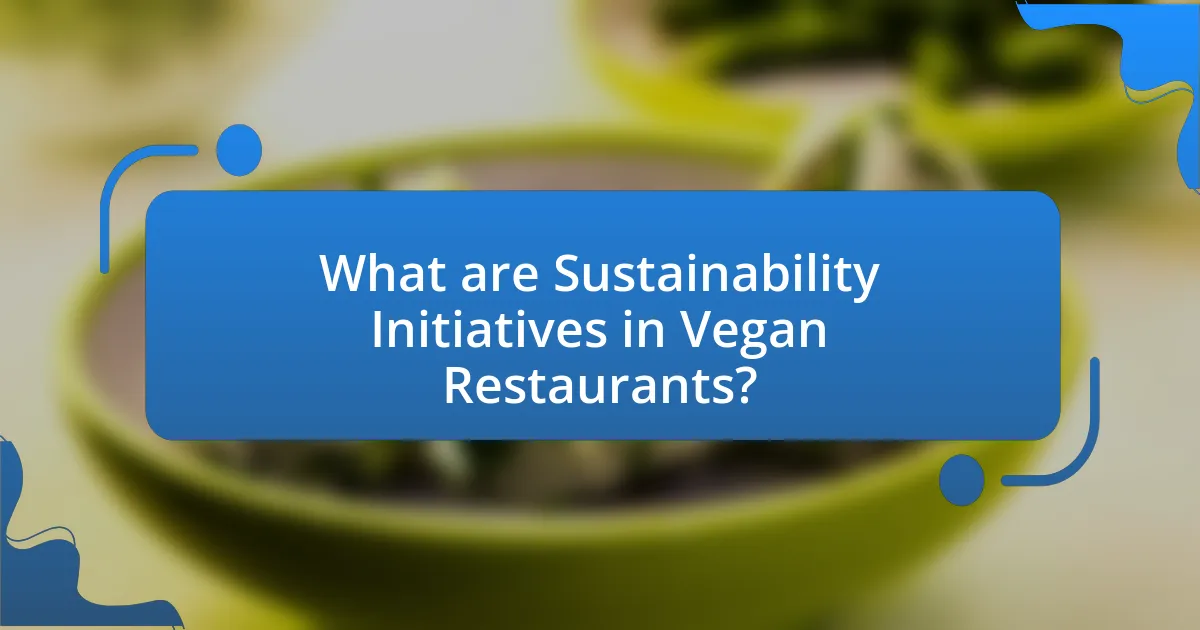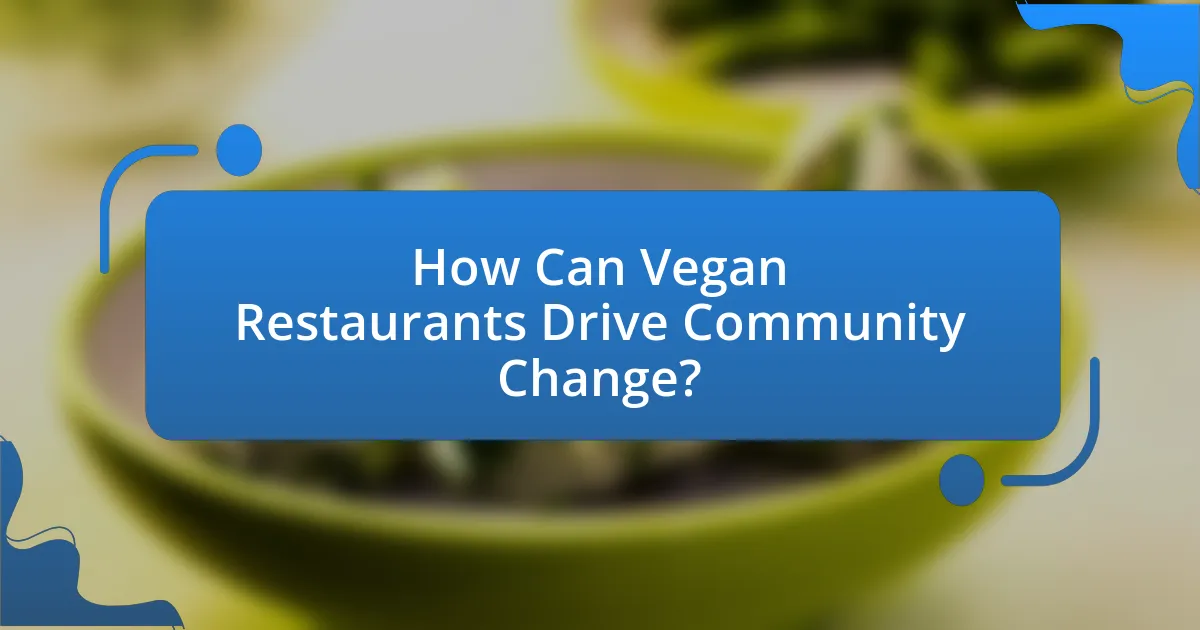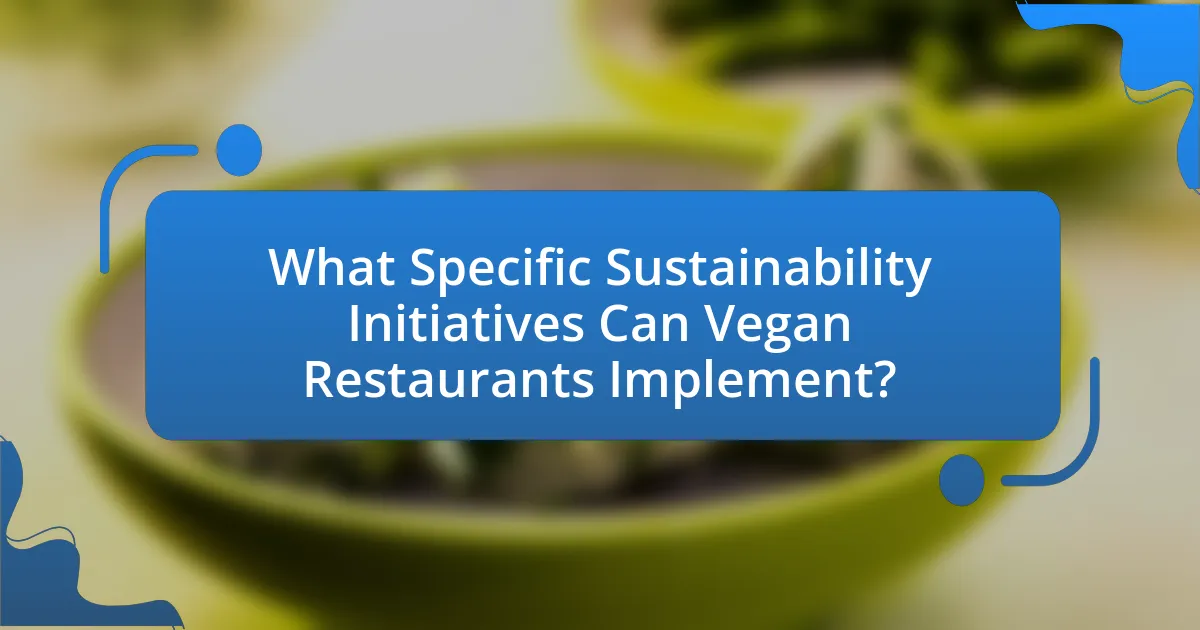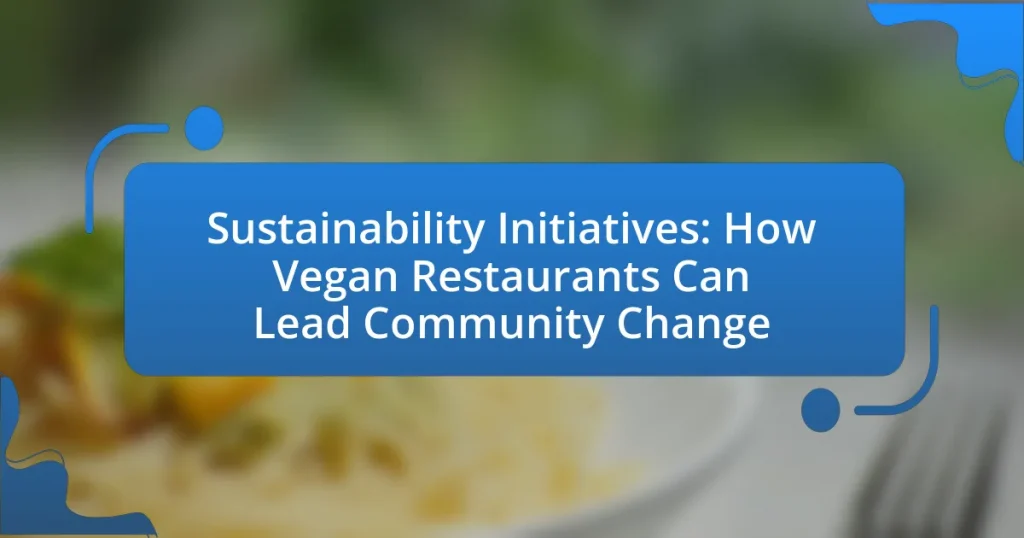The article focuses on sustainability initiatives within vegan restaurants and their role in driving community change. It outlines various practices such as sourcing local and organic ingredients, minimizing food waste, and utilizing eco-friendly packaging, which collectively reduce environmental impact. The article also discusses how vegan restaurants influence consumer behavior towards sustainable eating, foster community engagement, and form partnerships to enhance their impact. Additionally, it highlights the long-term benefits of these initiatives for public health and environmental stewardship, emphasizing the importance of community involvement in sustainability efforts.

What are Sustainability Initiatives in Vegan Restaurants?
Sustainability initiatives in vegan restaurants include practices aimed at reducing environmental impact and promoting ethical consumption. These initiatives often involve sourcing ingredients locally to minimize carbon footprints, utilizing organic produce to avoid harmful pesticides, and implementing waste reduction strategies such as composting and recycling. For instance, a study by the Food and Agriculture Organization highlights that local sourcing can reduce transportation emissions by up to 50%. Additionally, many vegan restaurants adopt energy-efficient appliances and sustainable packaging to further decrease their ecological footprint. These practices not only support environmental sustainability but also encourage community awareness and participation in eco-friendly habits.
How do vegan restaurants contribute to sustainability?
Vegan restaurants contribute to sustainability by reducing the environmental impact associated with animal agriculture. Studies indicate that plant-based diets require significantly less land, water, and energy compared to diets high in animal products. For instance, a report from the Food and Agriculture Organization (FAO) highlights that livestock production accounts for approximately 14.5% of global greenhouse gas emissions, while plant-based food systems generate far fewer emissions. Additionally, vegan restaurants often prioritize local and organic ingredients, which further minimizes carbon footprints associated with transportation and chemical fertilizers. By promoting plant-based eating, these establishments encourage a shift towards more sustainable food systems, ultimately fostering community awareness and engagement in environmental issues.
What practices do vegan restaurants implement for sustainability?
Vegan restaurants implement several practices for sustainability, including sourcing local and organic ingredients, minimizing food waste, and using eco-friendly packaging. By sourcing local produce, these establishments reduce transportation emissions and support local farmers, which contributes to the local economy. Minimizing food waste is achieved through practices such as composting and donating surplus food, which helps divert waste from landfills. Additionally, using biodegradable or recyclable packaging reduces plastic pollution, aligning with sustainability goals. These practices collectively enhance the environmental impact of vegan restaurants, making them leaders in sustainable dining.
How do these practices impact the environment?
Vegan restaurant practices significantly reduce environmental impact by lowering greenhouse gas emissions, conserving water, and minimizing land use. Research indicates that plant-based diets can reduce carbon footprints by up to 50% compared to meat-based diets, as livestock farming is a major contributor to methane emissions and deforestation. Additionally, producing plant-based foods generally requires less water; for instance, it takes approximately 1,800 gallons of water to produce one pound of beef, while only 200 gallons are needed for a pound of vegetables. This shift towards veganism not only promotes biodiversity by reducing habitat destruction but also encourages sustainable agricultural practices that can lead to healthier ecosystems.
Why are vegan restaurants considered leaders in sustainability?
Vegan restaurants are considered leaders in sustainability because they promote plant-based diets that significantly reduce environmental impact. Research indicates that animal agriculture is responsible for approximately 14.5% of global greenhouse gas emissions, while plant-based diets require fewer natural resources, such as water and land. By prioritizing plant-based ingredients, vegan restaurants contribute to lower carbon footprints and decreased deforestation rates. Additionally, many vegan establishments implement sustainable practices, such as sourcing local produce and minimizing food waste, further enhancing their role in fostering environmental stewardship.
What unique advantages do vegan restaurants have in promoting sustainability?
Vegan restaurants uniquely promote sustainability by significantly reducing the environmental impact associated with animal agriculture. These establishments typically utilize plant-based ingredients, which require fewer natural resources such as water and land compared to meat production. For instance, producing one pound of beef requires approximately 1,800 gallons of water, while growing a pound of vegetables requires only about 39 gallons. Additionally, vegan restaurants contribute to lower greenhouse gas emissions; livestock farming is responsible for about 14.5% of global emissions, whereas plant-based diets can help mitigate this issue. By prioritizing plant-based menus, vegan restaurants not only cater to health-conscious consumers but also foster a more sustainable food system, encouraging local sourcing and reducing carbon footprints.
How do vegan restaurants influence consumer behavior towards sustainability?
Vegan restaurants influence consumer behavior towards sustainability by promoting plant-based diets that reduce environmental impact. Research indicates that plant-based diets can lower greenhouse gas emissions by up to 70% compared to meat-based diets. By providing accessible and appealing vegan options, these restaurants encourage consumers to make more sustainable food choices. Additionally, vegan restaurants often emphasize local sourcing and organic ingredients, further enhancing their sustainability message. This shift in consumer behavior is supported by studies showing that exposure to vegan dining options increases the likelihood of individuals adopting sustainable practices in their own lives.

How Can Vegan Restaurants Drive Community Change?
Vegan restaurants can drive community change by promoting sustainable eating habits and reducing environmental impact. By offering plant-based menus, these establishments encourage consumers to choose healthier, eco-friendly options, which can lead to a decrease in meat consumption. Research indicates that adopting a vegan diet can reduce an individual’s carbon footprint by up to 50%, highlighting the significant environmental benefits of plant-based eating. Additionally, vegan restaurants often engage in local sourcing, supporting nearby farmers and reducing transportation emissions, which fosters community economic growth. Through educational initiatives and partnerships with local organizations, vegan restaurants can also raise awareness about the benefits of sustainability, further influencing community attitudes and behaviors towards food choices.
What role do vegan restaurants play in local communities?
Vegan restaurants play a significant role in local communities by promoting sustainable eating practices and fostering health-conscious lifestyles. These establishments often source ingredients locally, which supports regional farmers and reduces carbon footprints associated with food transportation. For instance, a study published in the Journal of Environmental Management found that plant-based diets can reduce greenhouse gas emissions by up to 70% compared to meat-based diets. Additionally, vegan restaurants serve as community hubs, encouraging social interaction and awareness around environmental issues, thus driving community engagement in sustainability initiatives.
How do vegan restaurants foster community engagement?
Vegan restaurants foster community engagement by creating inclusive spaces that promote social interaction and awareness around plant-based living. These establishments often host events such as cooking classes, workshops, and community dinners that encourage participation and dialogue among diverse groups. For instance, a study by the Journal of Community Health found that community-oriented events in restaurants can increase local social ties and enhance community cohesion. Additionally, vegan restaurants frequently collaborate with local farmers and organizations, supporting sustainable practices and fostering a sense of shared responsibility for environmental stewardship. This collaboration not only strengthens local economies but also cultivates a community identity centered around health and sustainability.
What partnerships can vegan restaurants form to enhance community impact?
Vegan restaurants can enhance community impact by forming partnerships with local farms, food banks, schools, and health organizations. Collaborating with local farms allows vegan restaurants to source fresh, organic produce, supporting local agriculture and reducing carbon footprints. Partnering with food banks enables restaurants to donate surplus food, addressing food insecurity while promoting plant-based diets. Collaborations with schools can involve educational programs about nutrition and sustainability, fostering awareness among students. Additionally, working with health organizations can promote plant-based eating as a means to improve public health, supported by studies showing that plant-based diets can reduce the risk of chronic diseases.
Why is community change important for sustainability?
Community change is important for sustainability because it fosters collective action and engagement, leading to more effective environmental practices. When communities come together to address sustainability issues, they can implement local solutions that reflect their unique needs and values, such as promoting plant-based diets through vegan restaurants. Research indicates that community-driven initiatives can reduce carbon footprints significantly; for instance, a study by the University of California found that local food systems can lower greenhouse gas emissions by up to 25%. This demonstrates that when communities actively participate in sustainability efforts, they can create lasting positive impacts on the environment.
How does community involvement enhance sustainability initiatives?
Community involvement enhances sustainability initiatives by fostering collaboration, increasing awareness, and driving collective action. Engaging local residents in sustainability efforts leads to shared ownership of projects, which can result in more effective implementation and long-term commitment. For instance, studies show that communities actively participating in environmental programs are more likely to adopt sustainable practices, as evidenced by a 2018 report from the Journal of Environmental Management, which found that community-led initiatives in urban areas reduced waste by up to 30%. This collaborative approach not only amplifies the impact of sustainability initiatives but also builds a sense of community, encouraging individuals to contribute to a healthier environment.
What are the long-term benefits of community change driven by vegan restaurants?
Vegan restaurants drive long-term community change by promoting healthier eating habits, reducing environmental impact, and fostering social cohesion. Healthier eating habits are supported by studies indicating that plant-based diets can lower the risk of chronic diseases such as heart disease and diabetes, leading to improved public health outcomes. The environmental impact is mitigated as vegan restaurants contribute to reduced greenhouse gas emissions; research shows that animal agriculture is responsible for approximately 14.5% of global emissions, while plant-based diets require significantly less land and water. Additionally, vegan restaurants often serve as community hubs, encouraging social interaction and collaboration among diverse groups, which strengthens community ties and promotes inclusivity.

What Specific Sustainability Initiatives Can Vegan Restaurants Implement?
Vegan restaurants can implement specific sustainability initiatives such as sourcing local and organic ingredients, reducing food waste, and utilizing eco-friendly packaging. Sourcing local and organic ingredients minimizes transportation emissions and supports local farmers, which can enhance community ties and reduce the carbon footprint associated with food production. Reducing food waste can be achieved through practices like composting and donating surplus food, which not only lessens landfill contributions but also addresses food insecurity. Utilizing eco-friendly packaging, such as biodegradable or compostable materials, decreases plastic pollution and aligns with the values of sustainability that vegan restaurants promote. These initiatives collectively contribute to a more sustainable food system and demonstrate leadership in community change.
How can vegan restaurants reduce food waste?
Vegan restaurants can reduce food waste by implementing strategies such as precise inventory management, portion control, and utilizing surplus ingredients creatively. Precise inventory management helps ensure that ingredients are ordered based on actual demand, minimizing excess stock that may go unused. Portion control allows restaurants to serve appropriate amounts, reducing leftovers. Additionally, creatively using surplus ingredients in daily specials or composting can further minimize waste. According to a study by the Food Waste Reduction Toolkit, restaurants that adopt these practices can reduce food waste by up to 30%, demonstrating the effectiveness of these strategies in promoting sustainability.
What strategies can be employed to minimize food waste in vegan restaurants?
To minimize food waste in vegan restaurants, implementing inventory management systems is essential. These systems help track ingredient usage and expiration dates, allowing restaurants to order only what is necessary and reduce excess stock. Additionally, adopting a menu that emphasizes seasonal and local produce can further decrease waste, as these ingredients are fresher and have a longer shelf life.
Research indicates that food waste in restaurants can be reduced by up to 30% through effective inventory management and menu planning (Source: “Food Waste in the Restaurant Industry,” Journal of Foodservice Business Research, authors: J. A. Stangherlin, M. A. C. de Oliveira). Furthermore, engaging staff in training programs focused on waste reduction techniques, such as proper portioning and creative use of leftovers, can enhance awareness and accountability, leading to a significant decrease in food waste.
How can partnerships with local farms help reduce food waste?
Partnerships with local farms can significantly reduce food waste by facilitating the direct supply of fresh produce to vegan restaurants, thereby minimizing the time food spends in the supply chain. This direct sourcing allows restaurants to receive produce that is perfectly ripe and reduces the likelihood of spoilage, as food is harvested and delivered in a timely manner. According to a study by the Food Waste Reduction Alliance, local sourcing can decrease food waste by up to 30% due to improved freshness and reduced transportation time. Additionally, these partnerships often enable restaurants to utilize imperfect or surplus produce that might otherwise go unsold, further contributing to waste reduction.
What are the best practices for sourcing ingredients sustainably?
The best practices for sourcing ingredients sustainably include prioritizing local and seasonal produce, selecting organic and non-GMO options, and establishing relationships with ethical suppliers. Local and seasonal produce reduces transportation emissions and supports local economies, while organic farming practices minimize chemical use and promote biodiversity. Research indicates that organic farming can enhance soil health and reduce pollution (Reganold & Wachter, 2016, Nature). Additionally, sourcing from suppliers who adhere to fair trade principles ensures that farmers receive fair compensation, fostering social equity within the supply chain. Implementing these practices not only benefits the environment but also enhances the quality and freshness of the ingredients used in vegan restaurants.
How can vegan restaurants ensure they are sourcing local and organic ingredients?
Vegan restaurants can ensure they are sourcing local and organic ingredients by establishing direct relationships with local farmers and suppliers who prioritize organic practices. This approach allows restaurants to verify the sourcing of their ingredients and support local agriculture. Research indicates that sourcing locally can reduce carbon footprints by up to 25% compared to sourcing from distant suppliers, as highlighted in the “Local Food Systems: A Global Perspective” report by the Food and Agriculture Organization. Additionally, restaurants can participate in local farmers’ markets and community-supported agriculture (CSA) programs, which provide access to fresh, organic produce while fostering community ties.
What certifications should vegan restaurants look for when sourcing ingredients?
Vegan restaurants should look for certifications such as USDA Organic, Non-GMO Project Verified, and Certified Vegan when sourcing ingredients. USDA Organic certification ensures that ingredients are grown without synthetic fertilizers or pesticides, promoting environmental sustainability. Non-GMO Project Verified indicates that the ingredients are free from genetically modified organisms, aligning with consumer preferences for natural foods. Certified Vegan guarantees that no animal products or by-products are used, reinforcing the restaurant’s commitment to vegan principles. These certifications help ensure that the ingredients sourced are not only ethical but also environmentally friendly, supporting the broader sustainability initiatives within the community.
How can vegan restaurants educate their customers about sustainability?
Vegan restaurants can educate their customers about sustainability by incorporating informative materials and practices into their operations. For instance, they can provide menus that highlight the environmental benefits of plant-based eating, such as reduced greenhouse gas emissions and lower water usage compared to animal agriculture. Research indicates that plant-based diets can reduce an individual’s carbon footprint by up to 50%. Additionally, restaurants can host workshops or events focused on sustainable practices, such as composting and local sourcing, which can further engage customers in sustainability efforts. By actively sharing this information, vegan restaurants not only promote their menu but also foster a culture of environmental awareness among their patrons.
What methods can be used to raise awareness about sustainability initiatives?
To raise awareness about sustainability initiatives, effective methods include community engagement, educational programs, social media campaigns, and partnerships with local organizations. Community engagement fosters direct interaction, allowing individuals to participate in sustainability efforts, such as clean-up events or workshops. Educational programs in schools and community centers can inform people about the importance of sustainability and practical steps they can take. Social media campaigns leverage platforms like Instagram and Facebook to reach a broader audience, sharing impactful stories and visuals that highlight sustainability initiatives. Collaborating with local organizations can amplify efforts, as these partnerships can provide resources and access to wider networks, enhancing the visibility and impact of sustainability initiatives.
How can vegan restaurants create engaging educational programs for the community?
Vegan restaurants can create engaging educational programs for the community by offering cooking classes, workshops, and informational seminars focused on plant-based nutrition and sustainable practices. These programs can include hands-on experiences where participants learn to prepare vegan dishes, understand the health benefits of a plant-based diet, and explore the environmental impact of food choices. For instance, a study published in the Journal of Nutrition Education and Behavior found that cooking classes significantly increased participants’ knowledge and confidence in preparing healthy meals. By collaborating with local nutritionists and sustainability experts, vegan restaurants can enhance the credibility and appeal of their programs, fostering a deeper connection with the community and promoting a culture of sustainability.
What are practical steps vegan restaurants can take to lead by example?
Vegan restaurants can lead by example by implementing sustainable practices such as sourcing local and organic ingredients, minimizing food waste, and utilizing eco-friendly packaging. Sourcing local ingredients reduces carbon footprints associated with transportation and supports local economies, while organic farming practices promote biodiversity and soil health. Additionally, minimizing food waste through strategies like composting and donating surplus food can significantly reduce landfill contributions, as food waste accounts for approximately 30-40% of the food supply in the United States. Using biodegradable or recyclable packaging further demonstrates commitment to sustainability, as plastic pollution is a major environmental concern. By adopting these practices, vegan restaurants not only enhance their own sustainability but also inspire their communities to embrace similar initiatives.


